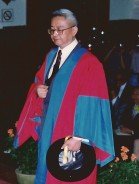
Yu Ying Shih was educated at Yenching University and then New Asia College where Dr Qian Mu presided as the grand master of intellectual history. On completing his PhD degree from Harvard in 1962, Yu Ying Shih embarked on an illustrious career in Michigan, Harvard, Yale and now Princeton. From 1973 to 1975 he took leave from Harvard to preside over New Asia College, his alma mater, and served concurrently as Pro-Vice-Chancellor of the Chinese University of Hong Kong, where he drafted recommendations on educational policy which were incorporated in the Fulton Report of 1976. In 1977, the Chinese University conferred on him an Honorary Doctoral Degree in Laws.
Yu Ying Shih's lifelong quest is for a true understanding of the Chinese cultural tradition and its place in world history. Whilst he is not prepared to judge Edward Said's thesis that the West "saw the Orient as a locale requiring Western attention, reconstruction, even redempton", Yu Ying Shih believes that Orientalism was as much intellectually informed by positivism as it was ideologically shaped by imperialism. With history figuring centrally as a discipline in Orientalism, he decided to research on Trade and Expansion in Han China, investigating the relevance of sinicisation, barbarisation and commercialisation, and pinpointing the importance of the merchant class in China's cultural heritage. His research repertoire includes themes on modern Chinese intellectual history, the role of the literati in Chinese Culture and a holistic evaluation of Chinese culture. These have been published under more than one hundred titles in books and articles.
His present research addresses changes and discontinuity in Chinese intellectual trends. The Academia Sinica, in recognition of his distinguished scholarship, elected him Academician in 1974.
In his work The Literati and Chinese Culture, the Japanese version of which has been warmly received, Yu Ying Shih reviews the inter-relationship between the literati and the merchant class. Historians often ask the following question: "Why didn't capitalism develop in China?" The generally accepted answer points to state control through Confucianism which was responsible for the suppression of the merchant class. Yu Ying Shih, on the other hand, whilst accepting Max Webers's theory that capitalism in the West was developed on the basis not only of economic factors but also of factors inherent in European culture, goes on to claim that commercial capitalism did exist in China and that the merchant class became important in societal structure by the Ming and the Qing Dynasty. Merchants supported the ruling hierarchy and received protection in return. The way of merchants' also emerged as a respectable phenomenon as businessmen contributed to major community and philanthropic work. Yu Ying Shih believes that a special bond existed between the literati and the merchant class, resulting in the latter's rise in social status.
Mr Chancellor, you may wish to join our learned professor in an intellectual odyssey to rediscover the Chinese tradition in all its richness and individuality. If you do, you must study history again as an interpretive enterprise, a view upheld by our graduand. Today, the University wishes to recognise his distinguished scholarship and his outstanding contribution to the interpretation of Chinese intellectual history. It is therefore my privilege and honour to present to you Yu Ying Shih for the award of the Degree of Doctor of Letters honoris causa.
Citation written and delivered by Professor Lee Ngok, the Public Orator.




